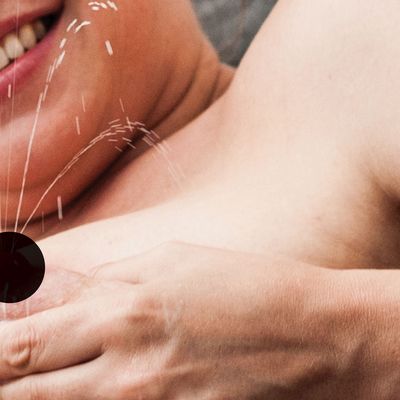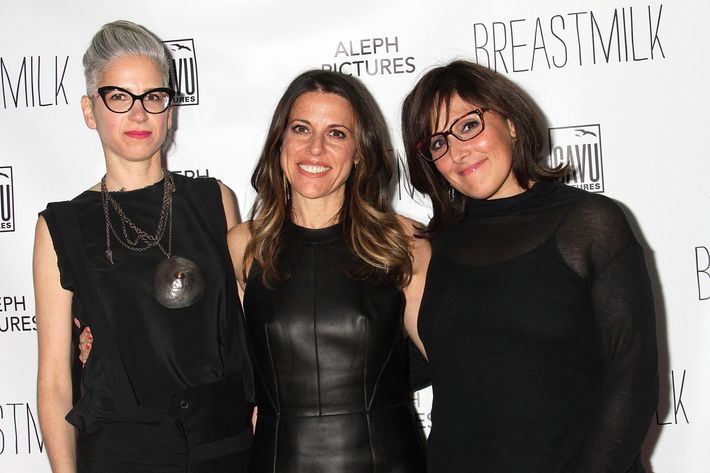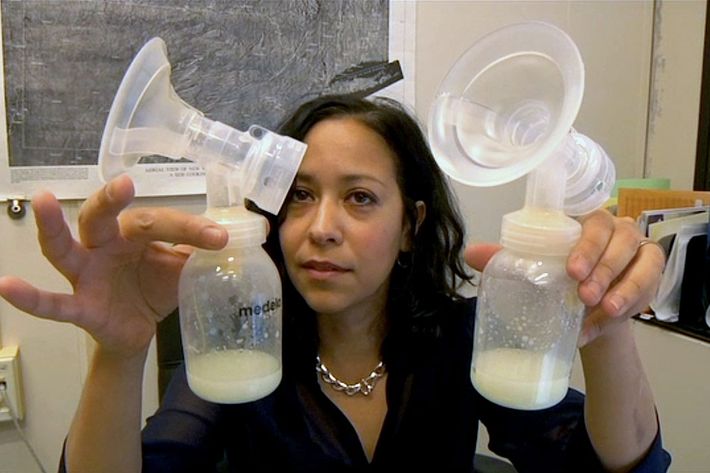
I’ve followed plenty of debates about breast-feeding in the last five years — and there were many — but I’d never actually seen a breast “express” milk, as they say in polite circles, until I saw Breastmilk, a documentary with more closeups of disembodied boobs than Spring Breakers, out this week in New York.
This, according to director Dana Ben-Ari, is the whole problem. A Brooklyn mother and former teacher in New York City public high schools, Ben-Ari made Breastmilk (her first documentary) in order to nonjudgmentally illustrate the challenges and rewards facing parents — rich, poor, black, white, straight, and gay — who want to breast-feed. Breastmilk simply and intimately depicts five new moms and dads over the first year of their babies’ lives, as they try to work breast-feeding around sleep and work and sex. (There are also some groovy interviews with feminist scholars about the “monstrous, leaky female body” and the “breast-as-phallus.”)
Breastmilk got a major publicity boost from its executive producers Ricki Lake and Abby Epstein, the team behind The Business of Being Born. “We have this audience and this credibility in this area, it felt like a natural extension,” Lake told the Cut on Tuesday. “Once you have that baby, what’s the next issue?”
The Cut talked to Lake, Epstein, and Ben-Ari on the eve of the film’s New York premiere.
The Business of Being Born set out to expose some of the things that are messed up about hospital childbirth in this country and destigmatize home birth. Is there a similar goal with Breastmilk?
Abby: When we started The Business of Being Born, Ricki was very informed and educated. She’d had two children and she’d experienced this very empowering home birth. I’d never been pregnant, and I literally was like, Midwives, ew. Why did you have your baby in your bathtub?
Ricki: Just so you know, we met doing the Vagina Monologues.
Abby: I directed her in the Vagina Monologues, so I thought I was this power feminist, but I was uninformed. I think it’s similar with Breastmilk. Dana speaks to this too. There’s this brand of feminism that’s not fully inclusive of these issues
Dana: I was exposing the reality of the experiences and saying this is what we go through, this is what it’s like, and then commenting on it.
Ricki: It’s about informing the consumer of the choices that you have.

This is just another way to go about informing and empowering women.
Abby: The thing we both loved about Dana’s film was the restraint of it. You could tell, like, yeah, this woman is probably pretty pro-breast-feeding but she’s not gonna be too pushy with her personal experience. She’s kind of stayed out of it and let us watch these characters go through what they’re going to go through.
Dana: It was really hard not to tell the women what to do. But breast-feeding is a topic that everyone feels they can have an opinion about, because public breast-feeding affects everyone on the train, so everyone can give their opinion. Women’s breasts are up for grabs. Vaginas are a little harder. Breast-feeding is more about how women use their bodies publicly than privately.
Was it difficult to get subjects to open their bodies up to the camera?
Dana: Most of them were willing. We had an on-camera interview while they were pregnant so we could hear about their plans and their fears. That gave us a chance to get acquainted with them, and they let us in. Our cameraman is very good looking, which helps. Still, I was surprised by their openness. I would not have volunteered to do this. But I think they felt respected, and the film proves that they were.
I’m ashamed to admit that some scenes — like the long montage of squirting breasts set to opera music — still felt totally graphic to me. What’s up with that?
Dana: It’s a very boring answer, and the answer is because we still live in a very patriarchal society, racist, all of the above, you can add to the list.
Abby: Ricki and I are working on a new film about the birth control pill, and one of the things we’re looking at are these fertility apps. Part of what you have to do with these apps is to check the consistency of your cervical mucus. We talked to the salesmen, and they’re like, “I learned really quickly in business meetings not to say cervical mucus.” But that’s part of the app! It’s something you have to do!
Ricki: You have to learn your body; know where your cervix is.
Abby: It’s body literacy. All of this stupid squeamishness about squirting breasts or cervical mucus hurts women in the end.
I guess my squeamishness is also a little ironic considering, as is discussed in the documentary, it’s all over porn.
Dana: Well, it’s okay in porn. It’s just not okay anywhere else. They should pay us for getting people to their sites. So many people seeing this movie had no idea lactation porn existed.

By the time audiences meet the parents, many of them already have a strong sense of guilt or anxiety about breast-feeding. In one of the earliest scenes, a mother refers to formula as “crack.” Where is that coming from?
Dana: It comes from the environment, our society. Women are made to feel guilty because they are told breast-feeding is better — most likely it is better — but it’s not necessarily something they can all achieve. So guilt comes from sending that message but then not providing the support to make it happen. If we provided the support to make it happen, we wouldn’t feel guilty and we wouldn’t feel pressured. We would just feel informed.
The Affordable Care Act says insurance plans have to cover breast pumps and employers have to provide workers with lactation breaks. What else would would you like to see, in a breast-feeding utopia?
Dana: There’s the specifics of legislation that would answer the utopia, but then there’s just the overall feeling and lifestyle philosophy approach to mainstream feminism that needs to change. Mainstream feminists want to say I’m all about work, I have to go to work, and enough about being forced to breast-feed. They question the agenda and is it really best and what about the science. I’m not interested in that question so much, because I think they’re missing the bigger picture, and that is: All women should have it available to them if they want to. We should have more flexibility in the workplace, and we don’t because we’re still stuck in that ‘50s, ‘60s, ‘70s model of being like men in the workplace. But right now mainstream feminism is much more interested in the debate between formula and breast, and I think that’s a big mistake.
Ricki: And also shaming women. This whole thing about breast-feeding in public, it’s the news all the time. It’s outrageous.




